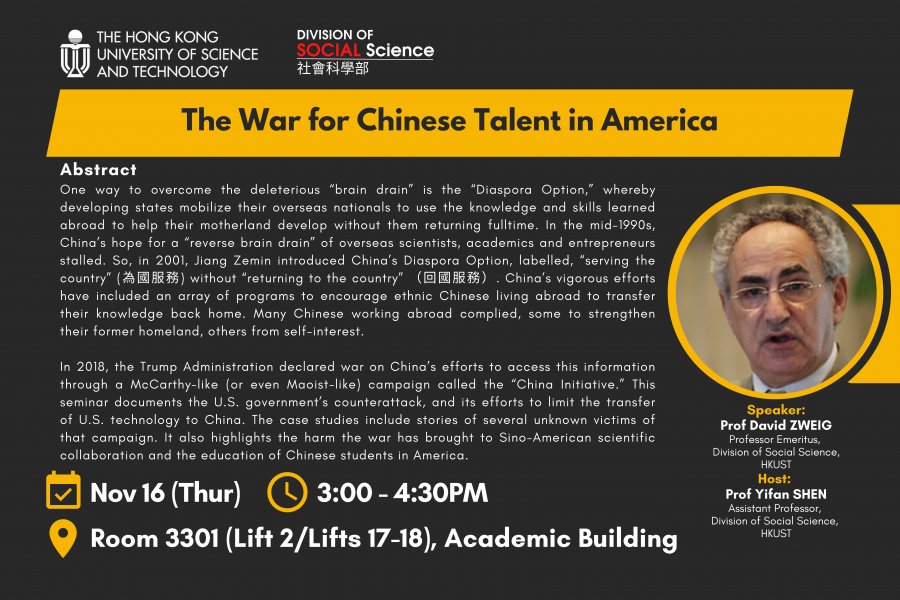One way to overcome the deleterious “brain drain” is the “Diaspora Option,” whereby developing states mobilize their overseas nationals to use the knowledge and skills learned abroad to help their motherland develop without them returning fulltime. In the mid-1990s, China’s hope for a “reverse brain drain” of overseas scientists, academics and entrepreneurs stalled. So, in 2001, Jiang Zemin introduced China’s Diaspora Option, labelled, “serving the country” (為國服務) without “returning to the country” (回國服務). China’s vigorous efforts have included an array of programs to encourage ethnic Chinese living abroad to transfer their knowledge back home. Many Chinese working abroad complied, some to strengthen their former homeland, others from self-interest.
In 2018, the Trump Administration declared war on China’s efforts to access this information through a McCarthy-like (or even Maoist-like) campaign called the “China Initiative.” This seminar documents the U.S. government’s counterattack, and its efforts to limit the transfer of U.S. technology to China. The case studies include stories of several unknown victims of that campaign. It also highlights the harm the war has brought to Sino-American scientific collaboration and the education of Chinese students in America.
David Zweig (Ph.D., The University of Michigan, 1983) is Professor Emeritus, Hong Kong University of Science and Technology and Distinguished Visiting Professor of Taipei School of Economics and Political Science, National Tsinghua University, Taiwan. He was a Postdoctoral Fellow at Harvard in 1984-85. He lived in Hong Kong from 1996 to 2019 and now resides in New York.
Zweig studied in Beijing in 1974-1976 and did field research in rural China in 1980-1981 and 1986, and in 1991-1992 he explored the internationalization of southern Jiangsu Province. Since 1991, he has surveyed and interviewed 100s of returned academics, scientists, entrepreneurs, and employees who returned to various cities in China, as well as those who have remained abroad. He has conducted about a dozen surveys on this topic. In 2012, he briefed the designer of the 1000 Talents Plan, Li Yuanchao, about why his program was struggling. He has been an expert witness for the defence in two cases under the U.S. Department of Justice’s “China Initiative,” which investigated many PRC-born Chinese working in America.
He has authored or edited ten books, including Internationalizing China (Cornell University Press). Almost 35,000 students have taken his two online classes with COURSERA on domestic Chinese Politics and on China and the World. His new book, on which this talk is based, is called “The War for Chinese Talent in America.”
Host: Prof Yifan SHEN, Assistant Professor, Division of Social Science, HKUST

